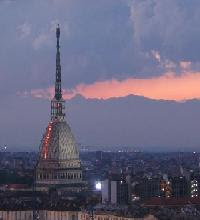+-+Front+cover.jpg)
“The least we can do is wave to each other”, pubblicato nel 1970, è il secondo album dei Van Der Graaf Generator (VDGG) anche se, in realtà, si tratta del primo vero lavoro attribuibile al gruppo. Infatti, il disco d’esordio “Aerosol grey machine” era stato composto e registrato in pratica come disco solista di Peter Hammill, cantante, autore e icona per antonomasia dei Van Der Graaf Generator.
“The least we can do is wave to each other” è stato il primo album dei VDGG che comprai (più o meno una trentina di anni fa) e rimane tuttora il mio preferito. Tutti i sei brani sono ugualmente affascinanti ma, soprattutto, questo album contiene “Refugees”, una delle canzoni più belle che abbia mai ascoltato in vita mia, un brano che ancora oggi mi fa venire i brividi, con la sua melodia sognante e, soprattutto, un testo meraviglioso - peculiarità tutt’altro che rara in un artista quale Peter Hammill, considerato uno degli autori di testi più talentuosi del genere progressive.
Il testo di “Refugees” mi intrippa al punto tale che ho deciso di proporvelo di seguito, tradotto liberamente in italiano dal sottoscritto (ferme restando le limitazioni che qualsiasi traduzione comporta):
Il Nord era da qualche parte, lontano negli anni e freddo:
i ghiacci intorpidivano gli animi delle persone, facendole invecchiare.
Il Sud partoriva invece terre amabili ma aride ...
Ho percorso le acque profonde ed esercitato la mia mente.
L’Est era l’alba che si ravvivava alla luce del sole dorato:
arrivarono poi le dolci brezze, e tutte le persone divennero un unico essere
durante l’estate, sebbene la gente se la ridesse;
vivevamo in pace ed eravamo felici.
Camminavamo da soli, talvolta mano nella mano,
attraverso la linea sottile che separa il mare dalla terra;
sorridendo nella più assoluta pace,
capimmo che avremmo potuto vivere liberi,
e fu allora che migrammo tutti insieme a Ovest.
E sarà proprio lì che il mondo prima o poi avrà fine,
nell’Ovest, dove il grigio si trasforma in giallo oro,
dove si può vivere in pace con quelli che amiamo,
e la luce illumina a sprazzi le nuvole dorate sopra di noi;
l’Ovest è la terra di Mike e Susie,
l’Ovest è dove dono il mio amore.
Nell’Ovest vivremo gli ultimi giorni della nostra vita,
racconteremo le solite vecchie storie ... se non altro, ci avremo provato.
Andremo a Ovest, con i sorrisi dipinti sui nostri volti;
portando le nostre scure a tutti quelli
che non scopriranno mai la strada giusta.
Siamo esuli, in fuga dalla vita
quella vita che abbiamo conosciuto e amato;
non c’è più niente da fare né da dire, nessun posto in cui vivere;
ora siamo soli.
Siamo esuli, in fuga con le nostre poche cose
chiuse in borse marroni avvolte con lo spago;
non abbiamo niente a cui pensare, niente ha più significato,
ma siamo felici dentro di noi.
l’Ovest è la terra di Mike e Susie,
l’Ovest è la casa di Mike e Susie.
L’Ovest è dove dono il mio amore,
la terra promessa di noi esuli.
La pregiata fattura musicale e letteraria non rappresenta l’unica caratteristica saliente di “The least we can …”. Infatti, questo disco fu registrato facendo ricorso alle tecniche di registrazione più avanzate disponibili all’epoca. I Van Der Graaf Generator sfruttarono al meglio tali mezzi, realizzando un album di notevole livello tecnico audio per quei tempi.
Voto personale (insufficiente / sufficiente / buono / distinto / ottimo / eccellente): Ottimo.
Released in 1970, “The least we can do is wave to each other” is the second album by English prog rock band Van Der Graaf Generator (a.k.a. VDGG). As a matter of fact, it is the very first album by the band, since the debut record “Aerosol grey machine” had been written and recorded as a solo record by singer, songwriter and band leader Peter Hammill.
“The least we can do is wave to each other” was the first VDGG’s album I bought (about thirty years ago) and still remains my favourite one. There’s no weak track on this album and, what’s more, “Refugees” is one of the best songs I’ve ever listened to in my life. In addition to the daydreaming tune, “Refugees” features wonderful lyrics – this being quite usual for such a talented as Peter Hammill, one of the best songwriters of all-time prog rock music.
I love the “Refugees” lyrics so much that I’m posting below the full text:
North was somewhere years ago and cold:
Ice locked the people's hearts and made them old.
South was birth to pleasant lands, but dry...
I walked the waters' depths and played my mind.
East was dawn, coming alive in the golden sun:
the winds came gently, several heads became one
in the summertime, though august people sneered;
we were at peace, and we cheered.
We walked along, sometimes hand in hand,
between the thin lines marking sea and sand;
smiling very peacefully,
we began to notice that we could be free,
and we moved together to the West.
West is where all days will someday end,
where the colours turn from grey to gold,
and you can be with the friends.
And light flakes the golden clouds above;
West is Mike and Susie,
West is where I love.
There we shall spend our final days of our lives,
tell the same old stories... yeah well, at least we tried.
So into the West, smiles on our faces, we'll go;
oh, yes, and our apologies to those
who'll never really know the way.
We're refugees, walking away from the life
that we've known and loved;
nothing to do nor say, nowhere to stay;
now we are alone.
We're refugees, carrying all we own
in brown bags, tied up with string;
nothing to think, it doesn't mean a thing,
but we can be happy on our own.
West is Mike and Susie,
West is Mike and Susie.
West is where I love,
West is refugees' home.
Excellent music and lyrics aren’t the only prerogatives of “The least we can …”. In fact, the album was recorded by making use of the most advanced studio recording technology at that time: the band made excellent use of the newest technology and created a record of outstanding technical quality for the time.
My personal mark (poor / pass / good / fairly good / very good / excellent): Very good.
VAN DER GRAAF GENERATOR (1970):
Peter Hammill - voce, chitarra acustica, piano in “Refugees” (lead vocals, acoustic guitar, piano on “Refugees”)
Hugh Banton - organo, piano, cori (organ, piano, backing vocals)
David Jackson - sax alto e tenore, flauto, cori (alto and tenor sax, flute, backing vocals)
Guy Evans - batteria e percussioni (drums and percussions)
Nick Potter - basso, chitarra elettrica (bass, electric guitar)
TRACK LIST:
1. Darkness
2. Refugees
3. White hammer
4. Whatever would Robert have said?
5. Out of my book
6. After the flood
THE LEAST WE CAN DO IS WAVE TO EACH OTHER (VAN DER GRAAF GENERATOR) - 60,5 MB




+-+Front+cover.jpg)




+-+Front+cover.jpg)





+-+Front+cover.jpg)
.jpg)
.jpg)
.jpg)
+-+Front+cover.jpg)
+-+Front+cover.jpg)
+-+Front+cover.jpg)









+-+Front+cover.jpg)







+-+Front+cover.jpg)



















